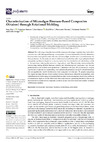Identificador persistente para citar o vincular este elemento:
https://accedacris.ulpgc.es/jspui/handle/10553/131983
| Título: | Characterization of Microalgae Biomass-Based Composites Obtained through Rotational Molding | Autores/as: | Díaz Guzmán, Sara Ester Romero Artiles, Francisco Ramón Suárez, Luis Rios Santana, Raul Jorge Alemán Vega, Monserrat Venuleo, Marianna Ortega Medina, Zaida Cristina |
Clasificación UNESCO: | 3313 Tecnología e ingeniería mecánicas 3303 ingeniería y tecnología químicas 3308 Ingeniería y tecnología del medio ambiente |
Palabras clave: | Biocomposite Microalgae Spirulina Rotomolding Antioxidant, et al. |
Fecha de publicación: | 2024 | Proyectos: | Laboratorio de Identificación, Caracterizacióny Eco-Toxicidad de Microplásticos Convencionalesy Nuevos Materiales Poliméricos Avanzados (Licem) | Publicación seriada: | Polymers | Resumen: | The wide range of applications and the numerous advantages of plastics have led to their excessive use, with subsequent damage to ecosystems. As an environmentally friendly alternative, biocomposites have gained much attention, and microalgae have become a potential source for their production. In this study, the use of washed and unwashed Spirulina in polyethylene-based composites has been evaluated as a way to prevent the thermooxidation of polyethylene, while at the same time, reducing the amount of virgin plastic used. Biocomposites were produced by rotomolding, testing different biomass contents and determining their mechanical and thermal performances as well as their water uptake level. Composites with up to 15% of biomass (by weight), a particularly high ratio for rotomolding, were satisfactorily produced. Using 5% of both biomasses did not significantly modify the behavior when compared with the neat PE samples’ properties. For higher loadings, the use of non-washed biomass allowed us to obtain better properties, with added benefits related to using an unwashed biomass (less water consumption, lower costs and fewer environmental impacts). On the other hand, this study showed a promising beneficial effect on the thermooxidative resistance of composites, as the oxidation induction times were notably increased with biomass addition. | URI: | https://accedacris.ulpgc.es/handle/10553/131983 | ISSN: | 2073-4360 | DOI: | 10.3390/polym16131807 | Fuente: | Polymers [ISSN 2073-4360], v. 16(13), 1807 |
| Colección: | Artículos |
Citas de WEB OF SCIENCETM
Citations
6
actualizado el 15-feb-2026
Visitas
9
actualizado el 11-ene-2026
Descargas
1
actualizado el 11-ene-2026
Google ScholarTM
Verifica
Altmetric
Comparte
Exporta metadatos
Los elementos en ULPGC accedaCRIS están protegidos por derechos de autor con todos los derechos reservados, a menos que se indique lo contrario.
